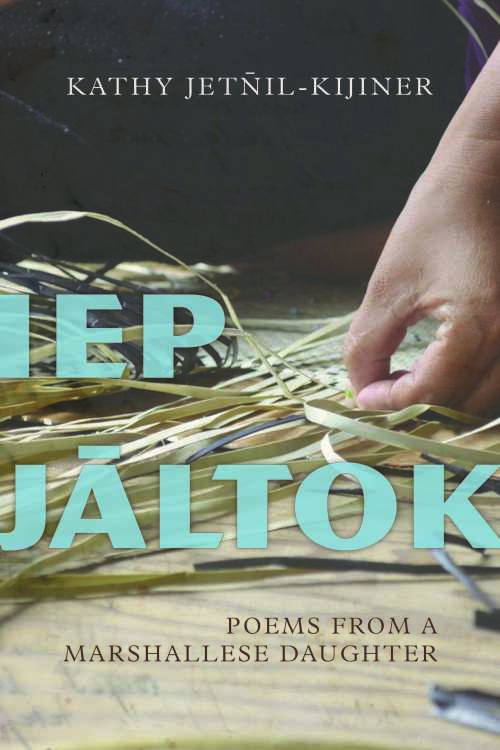Marshall Islands Poet Uses Each Syllable to Bring Attention to Her Threatened Home
Editor’s Note: This article is part of our ongoing #IndieVoices series of commentaries and features in the month of March focusing on Climate Change. Read the introduction to the series here.
Kathy Jetñil-Kijiner’s Iep Jāltok: Poems from a Marshallese Daughter (University of Arizona Press, Feb 2017), is the first book of poetry published by a Marshall Islander. Also a spoken word artist, she has performed all over the world. She was named a Climate Warrior by Vogue in 2015 and the Impact Hero of the Year by Earth Company in 2016.

Kathy Jetñil-Kijiner: 'Moving back home was a huge turning point for me, because that was when I first saw how vulnerable our country was.'

Jetñil-Kijiner writes passionately and movingly about the urgent environmental issues facing her island nation. She says her attention to climate change began when she returned after living and studying in the United States.
“When I came back to the Marshall Islands, that’s when I first confronted climate change and really began to face the realities of climate change,” Jetñil-Kijiner says. “Moving back home was a huge turning point for me, because that was when I first saw how vulnerable our country was, and that’s when I began to really do my research and dig into this issue of climate change. What are they saying about us in the news? What is our role as Marshallese people? What are the scientists saying?
“I always use my poetry to understand the world around me, and it just made sense for me to write about this new issue that was threatening our island. It began to really concern me as a young Marshallese.”
Jetñil-Kijiner discovered poetry as a channel for understanding and communicating about her world when she was in fifth grade.
“It sort became this thing that flowed out of me whenever I wanted to understand the world around me. … Then I had a spoken word workshop in my senior year. That was the first time that I saw the connection between the page and the audience, and that was really magical to me. I saw how it was this platform that I could use to really share stories that I felt to be important.”
As an undergraduate she was introduced to the role of poetry in social justice movements. Those revelations have become central to Jetñil-Kijiner’s career. In 2014, at age twenty-six, she was selected from hundreds of entries to be the civil society speaker during the opening ceremony of the UN Climate Summit in New York. Jeñtil-Kijiner wrote and performed “Dear Matefele Peinam,” a poem dedicated to her infant daughter that conjured the haunting threat of rising tides:
[…]
Dear Matafele Peinam,
I want to tell you about that lagoon
that lucid, sleepy lagoon
lounging against the sunrise
Men say that one day
that lagoon will devour you
[…]
The poem made waves at the event and afterward, and Jetñil-Kijiner has since made appearances on major media and at international conferences.
“It really changed my career around basically, because I was getting all of these requests to perform and to speak and I had a foot in the door to all of these climate change negotiations and conferences that I normally would not have had as a spoken word artist. That performance really launched me into these conversations.”
As a poet, Jetñil-Kijiner brings something new to those exchanges, using verse to help people pay attention to and relate to the daunting and urgent problem of climate change.
“I think what I really love about poetry is the meditative quality of it. It forces you to slow down. Each word, each line has meaning. It forces you to analyze a moment in time. With climate advocacy, it’s such a big problem. It’s so massive. It’s so easy to feel like you’ll just be swallowed up whole, but poetry forces you to slow down, to look at, to analyze this moment and to really see it for what it is. For me, poetry is a vehicle for understanding the issue at a deeper level.”
“Tell Them” captures the way Jetñil-Kijiner uses each word, syllable, and space to bring readers into the landscape of an island home threatened by climate change.
[…]
tell them about the water—how we have seen it rising
flooding across our cemeteries
gushing over the sea walls
and crashing against our homes
Tell them what it’s like
to see the entire ocean__level___with the land
Tell them
we are afraid
[…]
“[Poetry] humanizes the issue too,” she says. “It’s an opportunity for us to share our stories of humanity, that makes the issue more real, more grounded than this horrifying catastrophe that’s futuristic and Armageddon-like. It brings it down to a level where we can relate to it, where we can realize the urgency of it, and that we can find hope in it, too.”
For those human stories, Jetñil-Kijiner taps into the everyday experiences of her family. She also incorporates Marshallese legend into most of her poems.
“What I love about our legends is that you can’t get them from anywhere else. It’s our stories. I’m very conscious of using our legends in almost all of my poems because I think there is so much wisdom in them, and it also has that magical quality that I really love and enjoy.”
While Jetñil-Kijiner embraces her role with energy and job, being a high-profile advocate comes with pressures and challenges. She works to use her platform as a support for others.
“It’s not an easy role to undertake. It can be really draining to have to keep telling the same story over and over. It’s also a privilege, because not many people have this kind of platform to be heard. I try my best to use it to advocate for more people to join us in the fight, to support the work, to support our islands.”
The poet also partnered with her cousin to found Jo-Jikum, a Marshallese youth organization. In this kind of outreach, Jetñil-Kijiner cultivates hope for the environment and for the future of climate change literature.
“[I’m] trying to establish a home for youth who want to engage with environmental issues and climate change, and figuring out ways in which to support others because so many other people have stories that they should be able to tell as well.”
This drive to energize those who would make a better future infuses Jetñil-Kijiner’s poetry. By its conclusion, for example, “Dear Matefele Peinam” becomes a song of action and hope:
[…]
and there are thousands
out on the street
marching with signs
hand in hand
chanting for change NOW
and they’re marching for you, baby
they’re marching for us
because we deserve
to do more
than just
survive
we deserve
to thrive
[…]

Emily Avery-Miller is a writer and teacher in Boston. Her prose and reviews have appeared in Bird’s Thumb, Literary Bohemian, Art New England and others. @EBAverymiller
Emily Avery-Miller
